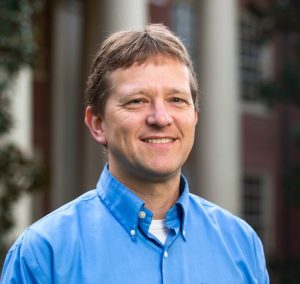Peter Sheldon wins national Society of Physics Students award

Peter Sheldon
For as long as Peter Sheldon can remember, he’s taken to heart an important notion: Science cannot be successful without the support of the general public.
It drives the work he does with students as Randolph’s Charles A. Dana Professor of Physics & Engineering and at events he oversees, like the Randolph College Science Festival and a Science + Art Saturdays program for high schoolers.
“Science and engineering are a big part of what advances us, and in order to be successful, we need support from those who are not scientists and engineers,” he said. “It has only become more poignant in recent years with so much distrust of science. I feel an urgency to encourage people to see its beauty, wonder, and relevance.”
This fall, Sheldon’s work was recognized when he earned a top national honor—the Society of Physics Students’ Outstanding Chapter Advisor for 2021-22.
The award is the most prestigious Society of Physics Students (SPS) award, given annually based on the leadership, student leadership development, support, and encouragement the advisor has provided to the chapter.
“The students and I have been working together so closely for years on SPS and the Science Festival, and we always figured that we are too small to be recognized by SPS national,” said Sheldon, who holds a Ph.D. and an M.S. in physics from the University of Massachusetts and a B.A. in physics and a B.A. in mathematics from Amherst College.
“I am so honored that our students have nominated me for this award, and it speaks volumes about not just the academic and co-curricular advising system at the College, but also about how we work in partnership on student success,” he added. “Our amazing science students are a big part of making this happen, and I am so happy to be able to work with them to make us all successful together. This award is not just for me, but is for the amazing work of our students and faculty. It is recognition of the excellence of Randolph College’s learning environment.”
Sheldon, who has received more than $5 million in grants for research and programming during his time at Randolph, started the College’s chapter of SPS and Sigma Pi Sigma, the physics honor society, in 1999, and has been the chapter advisor since its inception.
Under his leadership, Randolph students have won the Outstanding Chapter award more than a dozen times, most recently in 2020. In 2019, Sheldon was named Outstanding Chapter Advisor runner-up.
“One of the things we do so well at Randolph is mentor students,” he said. “That is the hallmark of what we do, and this award is just evidence that we do that with consistency, and we do it well.”
In their recommendation letter to SPS, Sheldon’s students wrote that he represents the true goal of the organization—to help students grow and become part of the larger community of physicists and engineers.
“If you look at any snapshot of Dr. Sheldon’s history at the College, you will see his continued commitment to students and science outreach,” said Hailey Gilman ’22. “He is a great mentor. He has incredible confidence in each student’s ability to succeed and always does his best to set us, as students, up for success. He is willing to work with us at all hours of the day and will make time to help whenever we’ve approached him.”
Gilman, the lead nominator for his student submission, was president of Randolph’s SPS chapter for four years and interned each year for the Science Festival, the College’s largest event.
“In my experience, a unique way he mentors is that he is not afraid for us to struggle and learn by failing a little bit too,” said Gilman, who is working at the College this fall as program coordinator for Randolph’s SUPER program and Science Festival assistant. “There is a lot of trust placed in students. He has no fear of assigning students responsibilities that may have larger consequences if they don’t happen. Personally, I feel a greater sense of accomplishment and achievement when completing these kinds of tasks.”
The importance of educating more scientists and engineers cannot be overstated, Sheldon said.
“My goal has always been to contribute to that need through encouragement and enthusiasm rather than through a traditional/stereotypical elitism,” he said. “We need more scientists and engineers of all and any sorts, but there is a particular need to help clear the path to success for students who are typically under-represented in science. We are missing out on so many opportunities by not encouraging and engaging all students in science.”
Tags: engineering, Engineering Physics, Peter Sheldon, physics, Vita No. 13
